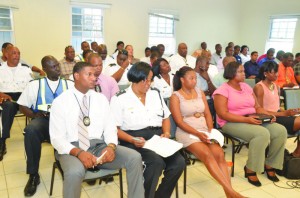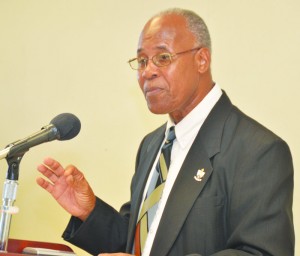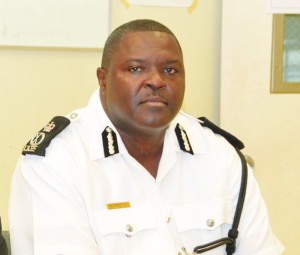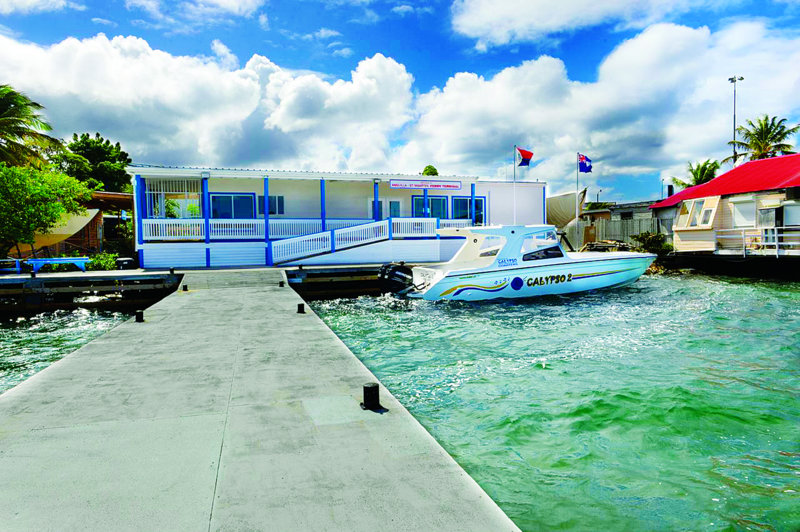
Police Commissioner, Rudolph Proctor, and other ranks of the Royal Anguilla Police Force, were at the receiving end of a candid lecture by Methodist Supernumerary Minister, the Reverend Dr H. Clifton Niles, on Monday, January 28.
Known for his forthrightness, Rev. Niles took the opportunity to praise the officers for their work; to caution them about pitfalls they should avoid in order not to bring dishonour to the Force; and to outline various challenges they should surmount in the practice of their profession.
“Mr. Commissioner, I wish to express my personal and sincere thanks to you and the entire Royal Anguilla Police Force for the great work you are doing,” Rev. Niles stated. “And I take the liberty, as a responsible citizen of Anguilla, to express to you and your colleagues, the profound gratitude of civil society for the work you do to maintain the peace and tranquillity of Anguilla. It is not a perfect job. There are shortcomings and, so, we urge you not to rest on your laurels, or to become discouraged or dismayed, but to continue to press on despite the challenges.”

His lecture covered the theme for Police Week: “Celebrating Our Achievements, Recognising Our Challenges and Embracing New Alliances”. Speaking about “Achievements”, he outlined three of them as follows, for which the Police could take credit: solving some of the outstanding major crimes in Anguilla; enhancing the relationship between the Police and the public due mainly to increased confidentiality on the part of the Police and greater Police presence in communities; and improvements in Police skills due to specific training, and the establishment of strategic linkages. “While you celebrate these three things, there is much ground ahead which is still to be covered,” Rev. Niles cautioned.
On “Recognising Our Challenges”, the Methodist Minister listed them in three categories: personal and professional; internal; and external. In the first category, he referred to the need to find a balance between the demands of the Police Force and the demands of personal and family matters. He also spoke about the need for Police Officers to be persons of integrity, moral rectitude and honour – and who have a love for principles, truth, honesty, justice and fairness.

With reference to the second category, he looked at the need to create a genuine team of officers in the Force to ensure harmonious living and successful policing – to avoid infighting and division. “On a scale of one to ten, how united are you as a team?” he went on. “Are there officers among you who betray the Force for personal gain and favours? Have you ever accepted a bribe or perverted the course of justice? Have you ever set a trap for a fellow officer, or failed to defend one who was in the right? Do you have each other’s back?
“Enhancing the team spirit requires sensitivity and fairness on the part of those at the top, honesty and diligence on the part of those who are not at the top, and commitment to the Force and the ideal of team spirit on the part of every officer. The stronger the team spirit, the greater the successes of the team.”
“The second internal challenge is that of building a greater Police capacity despite the serious limitations of human and national resources. Each year the capacity of the Royal Anguilla Police Force should grow and expand because of intentional planning, care of equipment and wise spending. By now, after forty-one years, on-going internal training should be a regular and targeted feature; by now there should be a well-developed finger-printing data base; by now there should be a Police lab, of no mean order, which would prevent financial drain and could become a source of income; by now your communication system should be better than anything which exists on the island.”
The third category of challenges, mentioned by Rev. Niles, was “external challenges”. He observed that while they existed outside the Force, they were directly related to and affected the Force, demanding it to respond. He noted that the first challenge had to do with the image of the Force in the minds and eyes of the public.
“Some Police Officers are seen in some circles as incompetent, easily bought, corrupt and unfair, not to be respected and not to be trusted,” he continued. “Fortunately, those who see the Police in this way are a very small minority. And I believe if there are any Police Officers who are guilty of such behaviour, they are only a very few. Nevertheless, ‘a chain is only as strong as its weakest link’ and ‘one spoiled mango affects the whole bag’.
“The challenge for the Force, from the top to the lowest private, is to become so intentionally disciplined and professional in everything you do, that the public will have to take a second look at you. When they do, they must see you as friends, and not foes; as fair-minded officers, not as favour-seekers; as confidants, not as crooks; as patriots, not pimps; crime-solvers, not criminal partners. They must see you as the professional guardians of the peace and wellbeing of the community.
“I will say without hesitation that when the public sees you in this way, the problems you now experience in getting them to come forward with information, regarding criminal activity, will largely disappear. In other words, the public support which is so lacking now will be forthcoming, many crimes will be solved more readily and criminal activities will decrease. Enhancing your public image and getting greater public support go hand in hand.
“The second external challenge is being able to respond appropriately to modern criminal activity which is increasing numerically, increasing in seriousness, and increasing in sophistication. In a population of approximately 13,000 persons, the criminal use of guns is far too common and the murder rate way too high. Who would have thought that in Anguilla we would have heard of a high day armed bank robbery, or of an attempted sophisticated ATM robbery, or of the importation of guns through the Post Office? Mr. Commissioner, you and your colleagues have a major challenge on your hands, but we have the confidence that you have both the capacity and the will to meet and overcome this particular challenge.
“Building more prison cells is not the real solution to increased criminal activity in Anguilla. I understand that currently there are some 76 prisoners – 2 females and 74 males – all able-bodied, vibrant, and cared-for, but who are largely unproductive during their time in prison. Criminals are made, not born, and I would urge that there should be a shift in our emphasis from catching to preventing. Of course, until the prevention mechanisms are in place, and working well, the catching has to go on.
“There is a real need for the Police, schools, groups, homes, churches and the public and private sectors to collaborate in an intentional effort to deal effectively with the crime situation. Do you know that there was a time when there were only Police Officers in Anguilla, and there were no prisoners?
“Our aim then must be reducing prisoners and closing prison cells, and this requires the full mobilisation of concerned citizens. Can the Police lead the way?”
Finally, on “Embracing New Alliances”, Rev. Niles said: “Alliances are critical in our modern world since the world is very much a global village – and criminal activity has taken on international dimensions. The Royal Anguilla Police Force can never exist or do well as an isolated Force. Alliances which already exist with the FBI, Scotland Yard and any other agency, must be expanded even as new ones are formed with the various Caribbean islands and the Central and South American nations. As these alliances are formed, the Royal Anguilla Police Force must be very clear about what you need and expect from each, and what you can give.”








